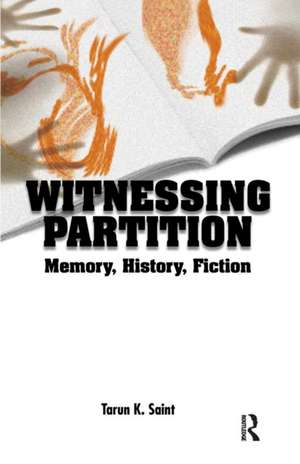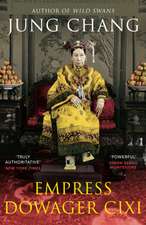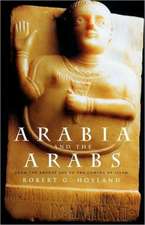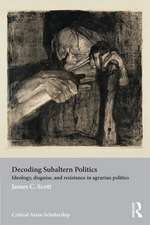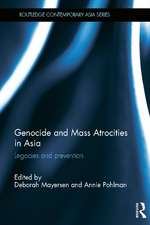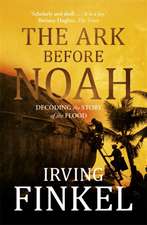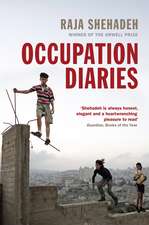Witnessing Partition: Memory, History, Fiction
Autor Tarun K. Sainten Limba Engleză Paperback – 21 ian 2016
| Toate formatele și edițiile | Preț | Express |
|---|---|---|
| Paperback (2) | 331.60 lei 6-8 săpt. | |
| Taylor & Francis – 21 ian 2016 | 331.60 lei 6-8 săpt. | |
| Taylor & Francis – 27 aug 2019 | 353.61 lei 6-8 săpt. | |
| Hardback (1) | 898.57 lei 6-8 săpt. | |
| Taylor & Francis – 27 aug 2019 | 898.57 lei 6-8 săpt. |
Preț: 331.60 lei
Nou
Puncte Express: 497
Preț estimativ în valută:
63.45€ • 66.43$ • 52.50£
63.45€ • 66.43$ • 52.50£
Carte tipărită la comandă
Livrare economică 05-19 aprilie
Preluare comenzi: 021 569.72.76
Specificații
ISBN-13: 9781138662612
ISBN-10: 1138662615
Pagini: 350
Dimensiuni: 138 x 216 x 19 mm
Greutate: 0.65 kg
Ediția:1
Editura: Taylor & Francis
Colecția Routledge India
Locul publicării:Oxford, United Kingdom
ISBN-10: 1138662615
Pagini: 350
Dimensiuni: 138 x 216 x 19 mm
Greutate: 0.65 kg
Ediția:1
Editura: Taylor & Francis
Colecția Routledge India
Locul publicării:Oxford, United Kingdom
Public țintă
PostgraduateCuprins
Introduction 1. Negotiating the Effects of Historical Trauma: Novels of the 1940s and 50s 2. Partition’s Afterlife: Perspectives from the 1960s and 70s 3. Narrativising the ‘Time of Partition’: Writings since 1980 4. Short Stories about the Partition: Towards a Self-Reflexive Mode of Testimony 5. Reinventing Testimonial Fiction in the Wake of the Partition Bibliography Index
Descriere
This book deals with the representation of the Partition of India — the experience of trauma and violence — through fiction, literary motifs and narratives, and shows that in examining the nature of such testimony through history, cultural memory has a significant role to play.
Notă biografică
Tarun K. Saint taught English literature for many years at Hindu College, Delhi University, India, and is now an independent scholar and writer. His research interests include the literature of the Partition and science fiction/speculative literature. He edited Bruised Memories: Communal Violence and the Writer (2002) and co-edited (with Ravikant) Translating Partition (2001). He has co-edited the anthology Looking Back: India’s Partition, 70 Years On (2017), with Rakhshanda Jalil and Debjani Sengupta. Recently, he has edited The Gollancz Book of South Asian Science Fiction (2019).
Recenzii
"Witnessing Partition, now updated to include recent writing and scholarship on the afterlives of Partition, remains crucial to our understanding of the many ways in which that process continues to structure politics and culture across the subcontinent. Highly recommended." — Suvir Kaul, A. M. Rosenthal Professor, Department of English, University of Pennsylvania, USA
"Tarun Saint’s Witnessing Partition: Memory, History, Fiction offers a lucid and scholarly account of novels about the wounds inflicted and traumas suffered by individuals and communities during the partition of 1947. The second edition of his book should again remind us about two contemporary ethical and political concerns: the troubling relation between religious, nationalist and racial politics and genocide; and the urgent need of 'courage-teachers' (satyagrahis) who always refuse, under all circumstances, hysterical demands for aggression and revenge. Tarun’s new "Afterword" argues that partition violence still haunts our present social and religious discourse; its scars have still not healed; its melancholy has yet not lifted." — Alok Bhalla, author of Stories about the Partition of India (4 volumes) and Partition Dialogues
"Tarun Saint’s Witnessing Partition: Memory, History, Fiction offers a lucid and scholarly account of novels about the wounds inflicted and traumas suffered by individuals and communities during the partition of 1947. The second edition of his book should again remind us about two contemporary ethical and political concerns: the troubling relation between religious, nationalist and racial politics and genocide; and the urgent need of "courage-teachers" (satyagrahis) who always refuse, under all circumstances, hysterical demands for aggression and revenge. Tarun’s new "Afterword" argues that partition violence still haunts our present social and religious discourse; its scars have still not healed; its melancholy has yet not lifted." — Alok Bhalla, author of Stories about the Partition of India (4 volumes) and Partition Dialogues
"Witnessing Partition, now updated to include recent writing and scholarship on the afterlives of Partition, remains crucial to our understanding of the many ways in which that process continues to structure politics and culture across the subcontinent. Highly recommended." — Suvir Kaul, A. M. Rosenthal Professor, Department of English, University of Pennsylvania, USA
"Tarun Saint’s Witnessing Partition: Memory, History, Fiction offers a lucid and scholarly account of novels about the wounds inflicted and traumas suffered by individuals and communities during the partition of 1947. The second edition of his book should again remind us about two contemporary ethical and political concerns: the troubling relation between religious, nationalist and racial politics and genocide; and the urgent need of 'courage-teachers' (satyagrahis) who always refuse, under all circumstances, hysterical demands for aggression and revenge. Tarun’s new "Afterword" argues that partition violence still haunts our present social and religious discourse; its scars have still not healed; its melancholy has yet not lifted." — Alok Bhalla, author of Stories about the Partition of India (4 volumes) and Partition Dialogues
"Tarun Saint’s Witnessing Partition: Memory, History, Fiction offers a lucid and scholarly account of novels about the wounds inflicted and traumas suffered by individuals and communities during the partition of 1947. The second edition of his book should again remind us about two contemporary ethical and political concerns: the troubling relation between religious, nationalist and racial politics and genocide; and the urgent need of "courage-teachers" (satyagrahis) who always refuse, under all circumstances, hysterical demands for aggression and revenge. Tarun’s new "Afterword" argues that partition violence still haunts our present social and religious discourse; its scars have still not healed; its melancholy has yet not lifted." — Alok Bhalla, author of Stories about the Partition of India (4 volumes) and Partition Dialogues
"Witnessing Partition, now updated to include recent writing and scholarship on the afterlives of Partition, remains crucial to our understanding of the many ways in which that process continues to structure politics and culture across the subcontinent. Highly recommended." — Suvir Kaul, A. M. Rosenthal Professor, Department of English, University of Pennsylvania, USA
